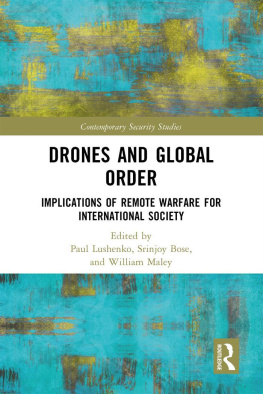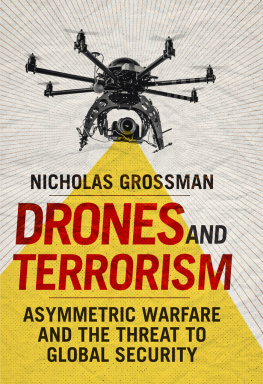Blum Gabriella - The future of violence : robots and germs, hackers and drones : confronting a new age of threat
Here you can read online Blum Gabriella - The future of violence : robots and germs, hackers and drones : confronting a new age of threat full text of the book (entire story) in english for free. Download pdf and epub, get meaning, cover and reviews about this ebook. year: 2015, publisher: Basic Books, genre: Politics. Description of the work, (preface) as well as reviews are available. Best literature library LitArk.com created for fans of good reading and offers a wide selection of genres:
Romance novel
Science fiction
Adventure
Detective
Science
History
Home and family
Prose
Art
Politics
Computer
Non-fiction
Religion
Business
Children
Humor
Choose a favorite category and find really read worthwhile books. Enjoy immersion in the world of imagination, feel the emotions of the characters or learn something new for yourself, make an fascinating discovery.

- Book:The future of violence : robots and germs, hackers and drones : confronting a new age of threat
- Author:
- Publisher:Basic Books
- Genre:
- Year:2015
- Rating:5 / 5
- Favourites:Add to favourites
- Your mark:
The future of violence : robots and germs, hackers and drones : confronting a new age of threat: summary, description and annotation
We offer to read an annotation, description, summary or preface (depends on what the author of the book "The future of violence : robots and germs, hackers and drones : confronting a new age of threat" wrote himself). If you haven't found the necessary information about the book — write in the comments, we will try to find it.
The ability to inflict pain and suffering on large groups of people is no longer limited to the nation-state. New technologies are putting enormous power into the hands of individuals across the world--a shift that, for all its sunny possibilities, entails enormous risk for all of us, and may even challenge the principles on which the modern nation state is founded. In short, if our national governments can no longer protect us from harm, they will lose their legitimacy. Detailing the challenges that states face in this new world, legal scholars Benjamin Wittes and Gabriella Blum controversially argue in [Title TK] that national governments must expand their security efforts to protect the lives and liberty of their citizens. Wittes and Blum show how advances in cybertechnology, biotechnology, and robotics mean that more people than ever before have access to technologies--from drones to computer networks and biological data--that could possibly be used to extort or attack states and private citizens. Security, too, is no longer only under governmental purview, as private companies or organizations control many of these technologies: internet service providers in the case of cyber terrorism and digital crime, or academic institutions and individual researchers and publishers in the case of potentially harmful biotechnologies. As Wittes and Blum show, these changes could undermine the social contract that binds citizens to their governments-- Read more...
Abstract: From drone warfare in the Middle East to the NSA digital spying, the U.S. government has harnessed the power of cutting-edge technology to terrible effect. But what happens when ordinary people have the same tools at their fingertips? Benjamin Wittes and Gabriella Blum reveal that this new world is nearly upon us. Soon, our neighbors will be building armed drones capable of firing a million rounds a minute and cooking powerful viruses based on recipes found online. These new technologies will threaten not only our lives but the very foundation of the modern nation state. Wittes and Blum counterintuitively argue that only by increasing surveillance and security efforts will national governments be able to protect their citizens. The Future of Violence is at once an account of these terrifying new threats and an authoritative blueprint for how we must adapt to survive.--
The ability to inflict pain and suffering on large groups of people is no longer limited to the nation-state. New technologies are putting enormous power into the hands of individuals across the world--a shift that, for all its sunny possibilities, entails enormous risk for all of us, and may even challenge the principles on which the modern nation state is founded. In short, if our national governments can no longer protect us from harm, they will lose their legitimacy. Detailing the challenges that states face in this new world, legal scholars Benjamin Wittes and Gabriella Blum controversially argue in [Title TK] that national governments must expand their security efforts to protect the lives and liberty of their citizens. Wittes and Blum show how advances in cybertechnology, biotechnology, and robotics mean that more people than ever before have access to technologies--from drones to computer networks and biological data--that could possibly be used to extort or attack states and private citizens. Security, too, is no longer only under governmental purview, as private companies or organizations control many of these technologies: internet service providers in the case of cyber terrorism and digital crime, or academic institutions and individual researchers and publishers in the case of potentially harmful biotechnologies. As Wittes and Blum show, these changes could undermine the social contract that binds citizens to their governments
Blum Gabriella: author's other books
Who wrote The future of violence : robots and germs, hackers and drones : confronting a new age of threat? Find out the surname, the name of the author of the book and a list of all author's works by series.














